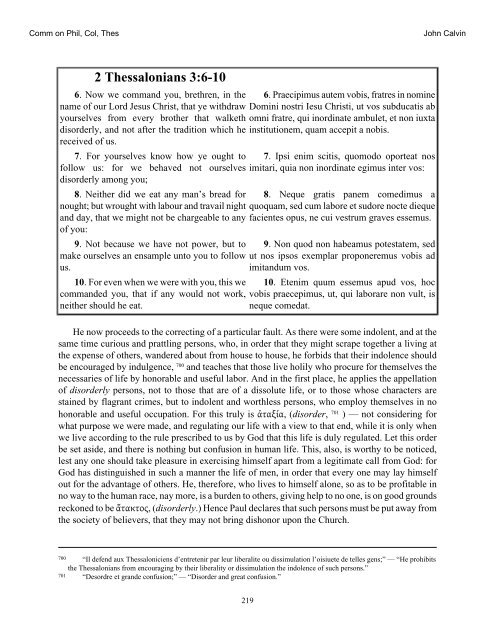Commentary on Philippians, Colossians, and Thessalonians
Commentary on Philippians, Colossians, and Thessalonians
Commentary on Philippians, Colossians, and Thessalonians
Create successful ePaper yourself
Turn your PDF publications into a flip-book with our unique Google optimized e-Paper software.
Comm <strong>on</strong> Phil, Col, Thes<br />
2 Thessal<strong>on</strong>ians 3:6-10<br />
6. Now we comm<strong>and</strong> you, brethren, in the 6. Praecipimus autem vobis, fratres in nomine<br />
name of our Lord Jesus Christ, that ye withdraw Domini nostri Iesu Christi, ut vos subducatis ab<br />
yourselves from every brother that walketh omni fratre, qui inordinate ambulet, et n<strong>on</strong> iuxta<br />
disorderly, <strong>and</strong> not after the traditi<strong>on</strong> which he instituti<strong>on</strong>em, quam accepit a nobis.<br />
received of us.<br />
7. For yourselves know how ye ought to 7. Ipsi enim scitis, quomodo oporteat nos<br />
follow us: for we behaved not ourselves imitari, quia n<strong>on</strong> inordinate egimus inter vos:<br />
disorderly am<strong>on</strong>g you;<br />
8. Neither did we eat any man’s bread for 8. Neque gratis panem comedimus a<br />
nought; but wrought with labour <strong>and</strong> travail night quoquam, sed cum labore et sudore nocte dieque<br />
<strong>and</strong> day, that we might not be chargeable to any facientes opus, ne cui vestrum graves essemus.<br />
of you:<br />
9. Not because we have not power, but to 9. N<strong>on</strong> quod n<strong>on</strong> habeamus potestatem, sed<br />
make ourselves an ensample unto you to follow ut nos ipsos exemplar prop<strong>on</strong>eremus vobis ad<br />
us.<br />
imit<strong>and</strong>um vos.<br />
10. For even when we were with you, this we 10. Etenim quum essemus apud vos, hoc<br />
comm<strong>and</strong>ed you, that if any would not work, vobis praecepimus, ut, qui laborare n<strong>on</strong> vult, is<br />
neither should he eat.<br />
neque comedat.<br />
He now proceeds to the correcting of a particular fault. As there were some indolent, <strong>and</strong> at the<br />
same time curious <strong>and</strong> prattling pers<strong>on</strong>s, who, in order that they might scrape together a living at<br />
the expense of others, w<strong>and</strong>ered about from house to house, he forbids that their indolence should<br />
be encouraged by indulgence, 700 <strong>and</strong> teaches that those live holily who procure for themselves the<br />
necessaries of life by h<strong>on</strong>orable <strong>and</strong> useful labor. And in the first place, he applies the appellati<strong>on</strong><br />
of disorderly pers<strong>on</strong>s, not to those that are of a dissolute life, or to those whose characters are<br />
stained by flagrant crimes, but to indolent <strong>and</strong> worthless pers<strong>on</strong>s, who employ themselves in no<br />
h<strong>on</strong>orable <strong>and</strong> useful occupati<strong>on</strong>. For this truly is ἀταξία, (disorder, 701 ) — not c<strong>on</strong>sidering for<br />
what purpose we were made, <strong>and</strong> regulating our life with a view to that end, while it is <strong>on</strong>ly when<br />
we live according to the rule prescribed to us by God that this life is duly regulated. Let this order<br />
be set aside, <strong>and</strong> there is nothing but c<strong>on</strong>fusi<strong>on</strong> in human life. This, also, is worthy to be noticed,<br />
lest any <strong>on</strong>e should take pleasure in exercising himself apart from a legitimate call from God: for<br />
God has distinguished in such a manner the life of men, in order that every <strong>on</strong>e may lay himself<br />
out for the advantage of others. He, therefore, who lives to himself al<strong>on</strong>e, so as to be profitable in<br />
no way to the human race, nay more, is a burden to others, giving help to no <strong>on</strong>e, is <strong>on</strong> good grounds<br />
reck<strong>on</strong>ed to be ἄτακτος, (disorderly.) Hence Paul declares that such pers<strong>on</strong>s must be put away from<br />
the society of believers, that they may not bring dish<strong>on</strong>or up<strong>on</strong> the Church.<br />
700 “Il defend aux Thessal<strong>on</strong>iciens d’entretenir par leur liberalite ou dissimulati<strong>on</strong> l’oisiuete de telles gens;” — “He prohibits<br />
the Thessal<strong>on</strong>ians from encouraging by their liberality or dissimulati<strong>on</strong> the indolence of such pers<strong>on</strong>s.”<br />
701 “Desordre et gr<strong>and</strong>e c<strong>on</strong>fusi<strong>on</strong>;” — “Disorder <strong>and</strong> great c<strong>on</strong>fusi<strong>on</strong>.”<br />
219<br />
John Calvin















